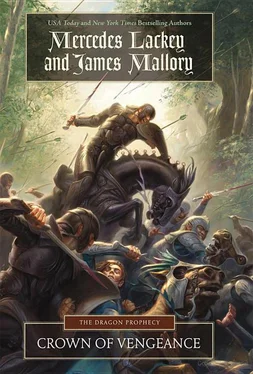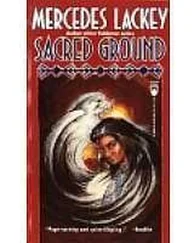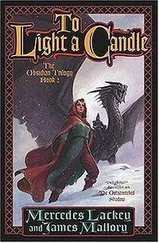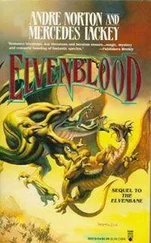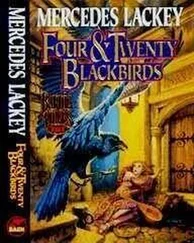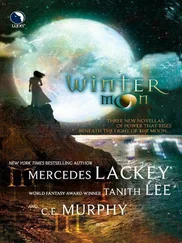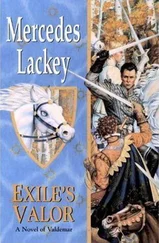It was time now to ride to battle once more.
She closed her eyes.
Merely to break through the Banespell’s defenses to read Amlunan’s true self was a terrible fight. She was forced to drop her own shields to See him clearly, and from that moment, the Banespell fed upon them both.
She had expected that. It was how she would win.
She felt the Banespell’s coldness slide into the marrow of her bones and knew her life to be measured now in heartbeats. Felt the malevolent shield its mistress had crafted for it wrap itself about her, sealing her away from all aid her brethren might render.
Sealing her within its compass with the one she sought to Heal.
Sometimes these spell-battles returned to her in dreams, clothing themselves in words and homely form. Sometimes she knew herself clad in armor of green and silver, wielding a sword that burned like starlight, mounted upon a destrier as white as the moon, fighting alone against a vast and ever-hungry horde of Beastlings until sword, armor, destrier—all—were stained with monstrous ichor.
Now she held the image of Amlunan strong within her mind, demanding of the Light that what she saw must become the world’s truth. Because she desired it. Because she willed it. Because the world itself must bow to the will of the Lightborn.
If the Lightborn was strong enough.
She felt Arevethmonion’s life beat brightly against her skin. Hers to command. Hers to wield. If she chose, she could drain it to dust, until nothing remained of it but sterile sand. She could drain the life from every leaf and stalk and tree and flower, then reach out and take the lives which filled the Sanctuary of the Star. Take the beasts of the fields, the birds of the air, the fishes of river, lake, and the vast ocean itself.
All could be hers, if she chose.
But not today. Even the vile sorcery of the Beastling shamaness was not great enough to outmatch Arevethmonion’s might, wielded by one who did not count the cost. Brightness beyond sun, beyond fire, beyond the matchless blaze of Silverlight filled her senses.
In that moment, it seemed the Light had voice, a living consciousness like her own. This is what I give, if you are strong enough to take it …
And her Healing was done.
She blinked dazedly at the walls of the Healing chamber. She felt suddenly alone, as if a dearly loved one had left her, for spellcraft was not without cost. Like a magnificent destrier, its power was the Lightborn’s to call and command, but to control its power was wearying as riding a high-couraged stallion and bending the beast to one’s will. Every Healer was taught to keep back enough power from the green life upon which it fed to heal one’s own hurts. This time, she had not been able to.
For long moments Vieliessar stared, exhausted, at nothing. Amlunan’s breathing had evened into true and restful sleep. She knew she should rouse herself and bring the news to Hervilafimir, but she could not find the strength. She came to herself at last as gentle hands lifted her to her feet.
“The jewel of Aramenthiali lives,” she heard Maeredhiel say. “As does nine-blessed Arevethmonion, despite your efforts. Now sleep.”
* * *
By the time Vieliessar could rise from her bed once more, Aramenthiali had departed the Sanctuary, but it had left behind it unexpected treasure.
“All I know is what I have said,” Hamonglachele said. “ Komen and great lords may speak before us as if we are nothing more than chests and tapestries, but they would surely notice if a tapestry were to question them!”
Vieliessar laughed, and shoved her counter across the gan board with one fingertip. Even as a Postulant, she had never entirely abandoned the Servants’ Hall, for it seemed uncivil to her to abandon old companions merely because of a change in fortune. Though she now wore Lightborn green, the servants still welcomed her as one of their own—and in truth, who else might she call friend? Candidates stayed for a scant wheel of seasons; Postulants for a decade or two. She could number upon her fingers the Lightborn who tenanted the Sanctuary for even half an Astromancer’s reign—and she did not call Hamphuliadiel or his court of sycophants ‘friend’.
“Did a tapestry hear that the Child of the Prophecy had risen in Haldil, I think even it would cry out,” Vieliessar said dryly.
“ ‘Aramenthiali helps to hold the West without thought for its own advantage because in the East, the Four Score behave as unruly children,’” Hamonglachele quoted mockingly. “Think you such a marvel can be true?”
“If Malbeth of Haldil is Child of the Prophecy, anything is possible,” Vieliessar said. “And I have you surrounded, Mistress ’Chele.”
Hamonglachele looked down at the board and laughed. “The student surpasses the master!” she cried. “I have nothing left to teach you.”
Vieliessar smiled, then scooped her counters off the board, for it was nearly time to dim the lamps. She tidied away the gan set and thanked Hamonglachele for the game, then walked from the Servants’ Wing back to her chamber.
It was a place less stark than her Postulant chamber had been. Her clothing belonged to her now, rather than being from a common store, and she possessed a fine carved chest that held winter and summer robes and underrobes. A shelf hung upon her wall, deep enough to hold scrolls borrowed from the library plus cherrybark canisters of her special tea blendings and a flat book where she recorded her experiments and recipes. Beneath it was a table at which she might sit to read or write, and a cushion on which to kneel. Though her bed was no softer than her Candidate’s bed had been, its frame was carved and polished and her blankets were of new wool.
She did not set the walls alight as she entered, but went to the window and folded back the shutters. Fire Moon was waning. Soon it would be Harvest—and what of Haldil then?
She was certain ’Chele knew as well as any here that Celelioniel had named her—and not Malbeth of Haldil—Child of the Prophecy. But to the Sanctuary servants, the title was empty words, a riddle meant only for scholars.
Or, as Haldil clearly had decided … a pretext.
There were a Hundred Houses divided into Great and Less, but any child of a great court knew there were more divisions than two. There were the Great Houses whose position was unquestioned—Caerthalien, Aramenthiali, Cirandeiron—which had held their places since Amrethion High King ruled. There were Less Houses which would never aspire to greater rank—Hallorad, Penenjil, Kerethant. And there were Less Houses which swore themselves High—but when one spoke of the “Four Score,” one spoke of the Less Houses of whose status there was no dispute. Those were the Houses held in clientage by this High House or that. In exchange for its protection, a High House demanded a yearly tithe, the right to call upon its client’s levy knights in time of war …
… and the renunciation of the Less House War Prince’s claim to the Unicorn Throne.
But Haldil did not look so high as to make itself High King’s House. Haldil was a House of the Grand Windsward; in claiming Malbeth as the fulfillment of Amrethion’s Prophecy, War Prince Gonceivis had declared “The time of High House and Low” was ended.
Which meant Haldil—and those who followed Haldil—renounced their clientage to their overlords in the West.
The tale had been played out a thousand thousand times in the histories she had read. The Hundred Houses fought among themselves. They would fight until the end of the world over who was to be High King. They had fought for thousands of years.
Haldith knows it does not hold the Child of the Prophecy. Enerchelimier has only to ask Celelioniel Lightsister to bear witness to that—should Enerchelimier wish to avow itself loyal. That she named me is—I think—no secret.
Читать дальше
